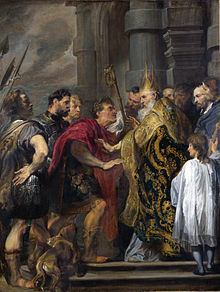395 A bad day for the Roman Empire
The death of the Roman emperor Theodosius I (347-395) meant the permanent separation of the eastern and western halves of the realm and his succession by a pair of nitwit sons unable to deal with the barbarian incursions.
Theodosius was a general and politician who emerged as emperor out of the civil wars that followed the death of Valens who died in 378 battling the Visigoths. His reign was extremely consequential. On the positive side he summoned the First Council of Constantinople which established Trinitarian orthodoxy; he suppressed pagan sacrifices, gladiatorial games, child slavery, and the Olympic Games. His massacre of civilians in Thessalonika led to his excommunication by Ambrose, Bishop of Milan. Theodosius was forced (above) to repent and beg forgiveness before being allowed the sacraments, an act which clergy over the centuries used as an example of the supremacy of the Church over the State.
His death in 395 led to the empire being split between incompetent sons, Honorius in the West and Arcadius in the East.
